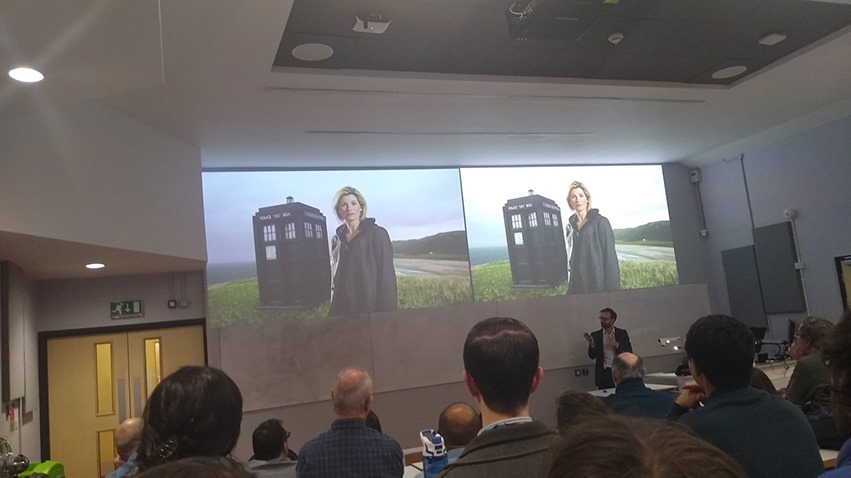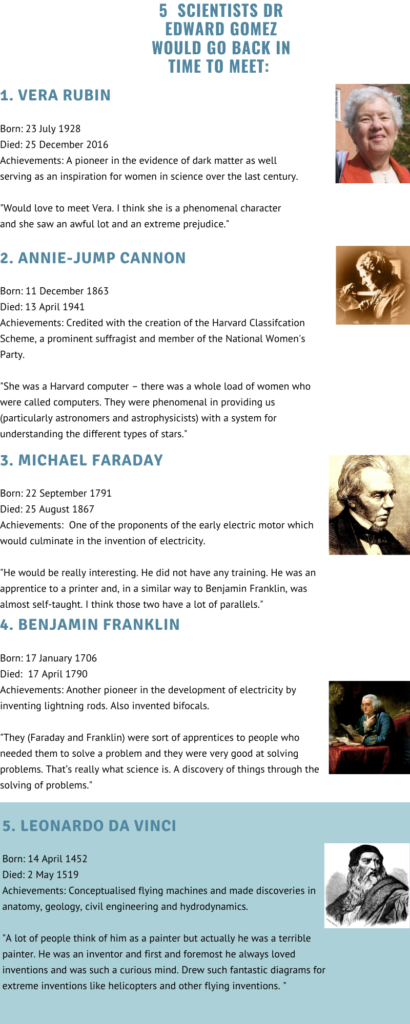Cardiff Science Festival kicks off delving deep into one of humanity’s most explored questions: “Is time-travel possible?”

Time-travel has long fascinated the human race.
To physically transport oneself into the future and discover whether the Earth will survive climate change, or to travel right back into the heart of the past and make sense of the origins of our complicated but beautiful planet, would change humanity forever.
As part of the Royal Astronomical Society’s 200th anniversary, and kicking off Cardiff’s Science Festival, an honorary lecturer from Cardiff University reflected on time-travel and its infinite possibilities to an engaged audience.
And for Dr Edward Gomez, his fascination in time-travel goes beyond its potential ramifications for mathematical and scientific study.
“People would like to go back and change something that they did wrong. Everybody has a thing or things that they feel like they could have done better at some point in the past. Or just reliving an experience. Going back in time and having one more afternoon with your grandparents. “
It is these types of things which make fiction interesting, he goes on to argue. “It is just another device to explore what the human condition is.”
This exploration of the human condition partly explains why time-travel oriented sci-fi shows such as Doctor Who have had strong telematic success and generated such interest in the tricky subject to its audience.
Put simply, shows like Doctor Who offer the spectator a chance to ponder what life would be like if we could ever travel back or forward in time.
“I think that’s why people are fascinated by time-travel, it’s the tantalising possibility that science offers which could help people in some terms live a better life.”
The show, relaunched in 2005 after an 18 year hiatus, explores this human condition in many ways: from going back in time to visit Vincent Van Gogh’s mental anguish and depression; basing an episode in Nazi Germany and questioning whether it was right to ‘kill Hitler’ or the moral quandary of finding yourself stuck in Pompei and debating whether or not, as the volcano erupts, the rules of time travel “allow” the Doctor to save one family who are about to drown to death.
These three episodes have something in common: The Doctor and their companions go back in time but not to change history. They are not allowed to, as per the show’s mechanisms, because of the effects this meddling would have on the past, present and future of the planet.
This is one of the main ethical problems with time-travel, if it were to someday become possible: where would it stop?
It is this worldwide fascination with Doctor Who and time-travel which has, in part, allowed Gomez to give talks at Harvard, Milan and Warsaw and other places, talking about robots, telescopes and planets.
Growing up, he simply wanted to be able to solve problems. Being a fan of Classic Doctor Who, a computer user and interested in astronomy, he always had had a keen interest in this area. And when he was studying for his A-levels he was taught by a former astronomer.
“God, I could do this. This is actually a discipline. A scientific discipline that I could study that matched my technology, space and computers and maths interests.”
Dr Gomez’s current research includes machine learning and investigating properties of galaxies, yet, additionally, he gives talks, interviews and chats aplenty about the science behind Doctor Who.
“When I meet scientists, they always say Cardiff! That’s where they film Doctor Who! Which is phenomenal for the city.”
Although Brexit is something that time-travel cannot fix, he argues that Britain’s decision to leave the European Union will do the field of astrophysics more harm than good.
“Oh my god Brexit is going to be disastrous for science.“
“Everyone who can do science would be like: why would I stay in Britain and not be on an international playing field? We have such special links. “
Just as the lecture ends, and the floor is open to the public, a small, primary school aged boy, asks a complicated question about a certain property of blackhole. The short answer, Gomez states, is he does not know the answer to this enthusiastically put inquiry.
The reality is, however, there is so much about the universe that we do not know about, with the possibility of time-travel, although tantalising, still a long way off.
And even though steps are being taken to increase scientific research in the matter, it will not happen anytime soon, or even in our lifetimes, despite the keen and attentive crowds at lectures like these.
“Actually, you have to deal with the situation you have right now or otherwise you will never be fulfilled,“ reflects Dr Gomez.

